What is Conceptual Selling? How to Use This Methodology to Sell More
November 30, 2022You keep telling your reps to sell the benefits rather than the features. Yet you still hear them pitch the latest product feature on their sales calls. But what if there’s a sales methodology that forces them to sell the solution?
Enter concept selling.
Concept selling, or conceptual selling, uses the premise that customers buy the concept of a solution and not the solution itself. For example, you don’t buy a sports car because of its horsepower or how quickly it goes from 0–60. You buy it because of how it makes you feel.
Conceptual selling does the same thing for B2B products. In this article, we’ll show you what conceptual selling is, why it works so well, and how you can help your sales team implement it successfully.
What is conceptual selling?
Robert Miller and Stephen Heiman created the idea of conceptual selling as a more effective way to close the high-value, complex deals that are common in enterprise sales. It’s a particularly effective tactic when dealing with multiple decision-makers.
The basis for this sales methodology is that prospects buy the concept a product is based on. In other words, they buy for their own reasons, which are usually different from the reasons the seller uses when marketing the product.
This teaches sellers to take the time to understand the buyer and position the product in terms they find appealing. Research, questioning, listening, and personalization are all vital during conceptual selling.
When using the conceptual selling strategy, sales reps aren’t just closing a deal — they’re also building long-term relationships that will bring in revenue and referrals for years to come.
What are the benefits of conceptual selling?
Why should you switch your existing sales methodology to conceptual selling? Because there are a few key benefits to using this framework.
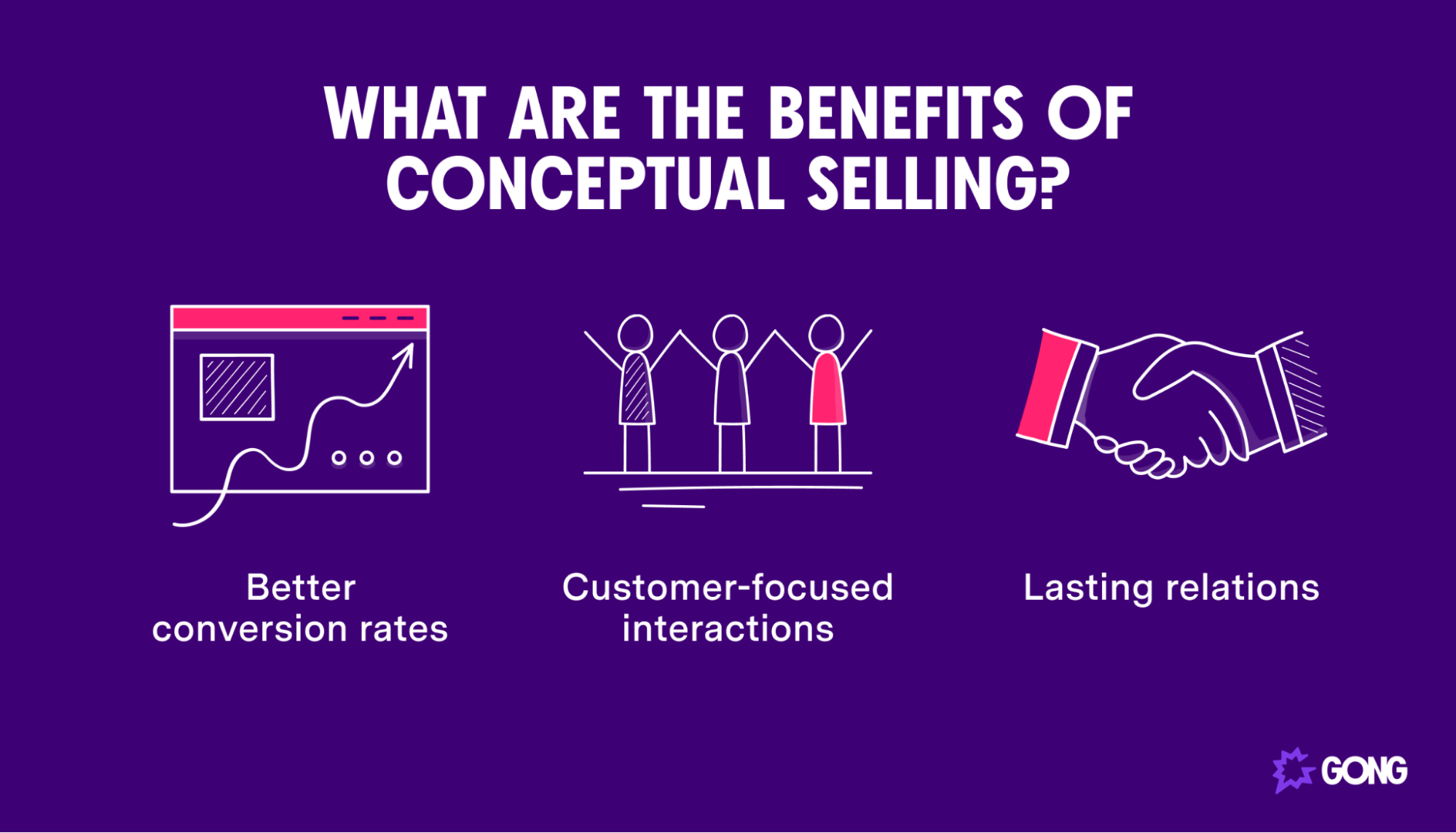
Let’s take a look.
Better conversion rates
Buyers have no shortage of options. If anything, they’re drowning in too much data, unable to decide.
Conceptual selling lets your reps swoop in and save them. Importantly, it helps sellers overcome the second-biggest deal killer — not understanding a company and its needs.
Rather than wooing buyers with facts and figures, conceptual selling forces reps to understand their prospects’ desires and position your product as the solution. They’re not selling facts or figures. They’re not even selling proven results. They’re selling the concept that buyers have been searching for.
Buyer-focused interactions
Around two-thirds of sellers say they always put the buyer first. But only 23% of buyers agree that sellers always put them first.
Conceptual selling will help you close this gap. This sales strategy forces reps to optimize their time with buyers and put them first.
How so?
Well, personalization is at the heart of the conceptual selling process. Delivering a cookie-cutter sales presentation doesn’t work. Reps are forced to personalize every interaction to sell the concept effectively.
It’s all about building relationships with buyers. And while this might be time-consuming, it’s actually a good thing. Building relationships is usually the thing that reps are best at, making this methodology an excellent fit for most sales teams.
Lasting relations
Buyers aren’t just a name to your sales reps when you use conceptual selling. They are human beings with real problems your sales reps care about.
Moreover, conceptual selling turns sales reps into great listeners who act as trusted consultants. This is precisely the kind of relationship today’s buyers demand. 88% of buyers agree that the salespeople they do business with are “trusted advisors.”
When your reps position themselves as a trusted advisor, they increase their chances of closing the deal and position themselves to continue selling to this client for years to come.
8 steps to successful conceptual selling
If you’re sold on the power of conceptual selling, then follow the eight steps below to make it a core part of your sales strategy.
1. Research your buyers
Thorough research is essential for conceptual selling. You need to have a deep understanding of your buyers including their pain points and motivations.
Encourage your reps to spend a serious amount of time researching prospects. How long? Well, research shows that top sellers spend an average of six hours per week researching their prospects.
Research should definitely happen before your reps first pick up the phone. But they can learn a lot more about their prospects through discovery calls.
Asking questions is obviously essential.
But there’s a fine balance between asking too many questions and asking too few. So what’s the perfect number? Between 11 and 14 per call.
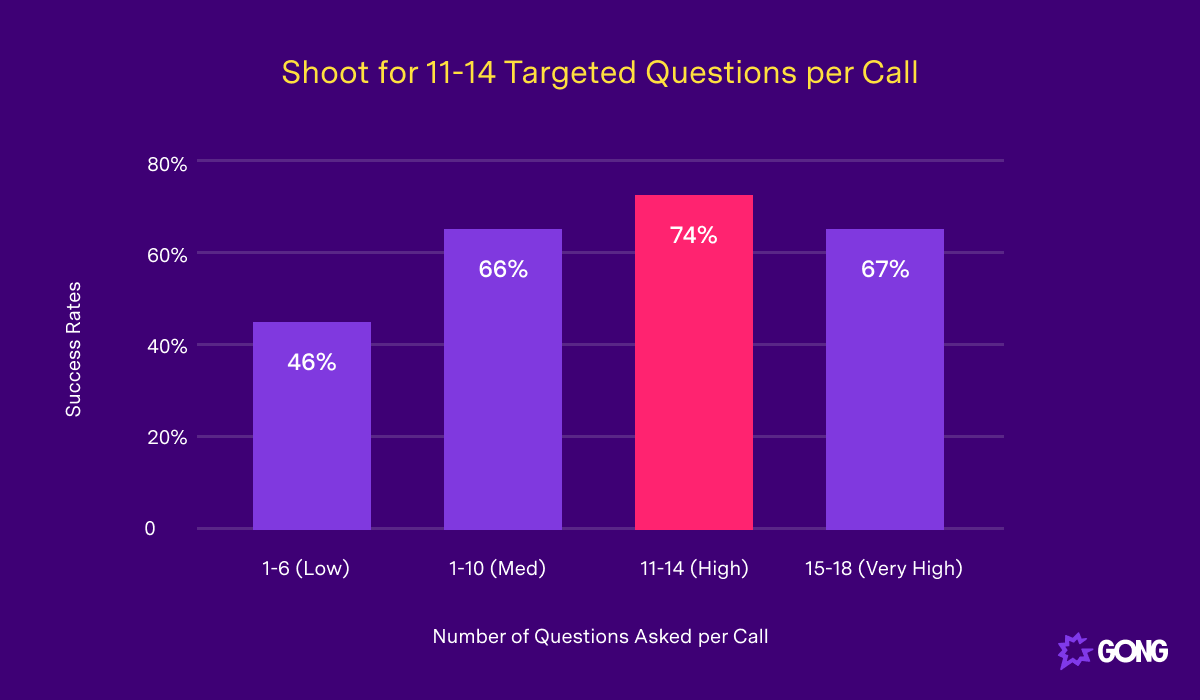
Our research shows that asking 11 to 14 questions results in the highest win rate on average. But really, your consultants should be asking as many questions as necessary to get the requisite information they need.
2. Align objectives
You and your reps need to realize there are two competing processes in a typical sales deal: your sales process and the buyer’s buying process.
Conceptual selling is all about aligning those objectives to create a win-win scenario. How does this work? First, reps can’t force themselves onto buyers. They need to take a consultative approach so that buyers trust them before making their pitch.
Second, they need to understand how the buyer’s buying process works. Who has authority? Who’s involved in the decision-making process? Is there a deadline? These are questions your reps need to answer.
3. Become a consultant
Great conceptual sellers are great consultants.
As we’ve already discussed, buyers want to buy from people they view as “trusted advisors,” so it’s your reps’ job to position themselves in that way.
How do your reps become good consultants? The key is not to focus on themselves. It’s all about putting the buyer first and meeting their needs. To do this, your reps need to understand your prospect’s pain points, which means asking great discovery questions.
The key to a great question is not only what you ask but also how you ask it.
In particular, reps need to reframe questions to get longer responses. That’s because there is a correlation between longer responses and success rates.
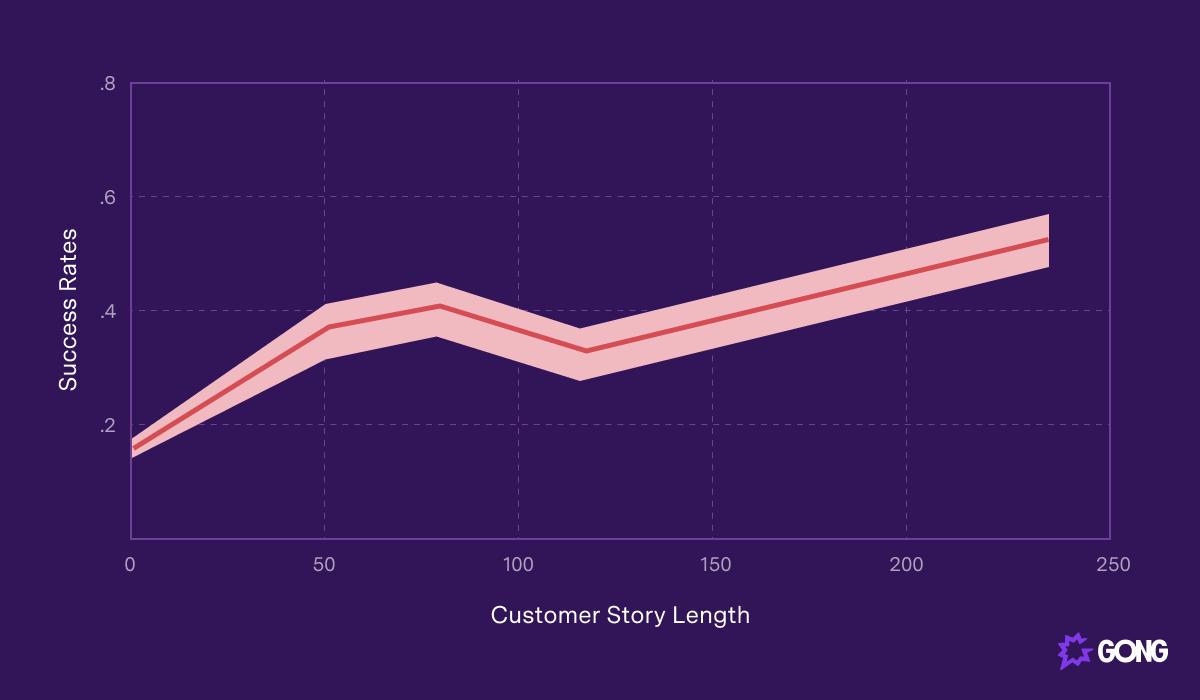
The longer the answer your prospect gives, the more data your reps will gather, and the more likely they’ll be able to use that information to personalize the pitch and close the deal.
4. Listen carefully
It’s not all about talking and asking questions, however. Your reps need to be excellent listeners to be great conceptual sellers. Only by listening can reps really find out what your buyers need.
In particular, reps need to listen to emphasize, not respond. That means talking less. Listening is a trait that many of the best reps have learned.
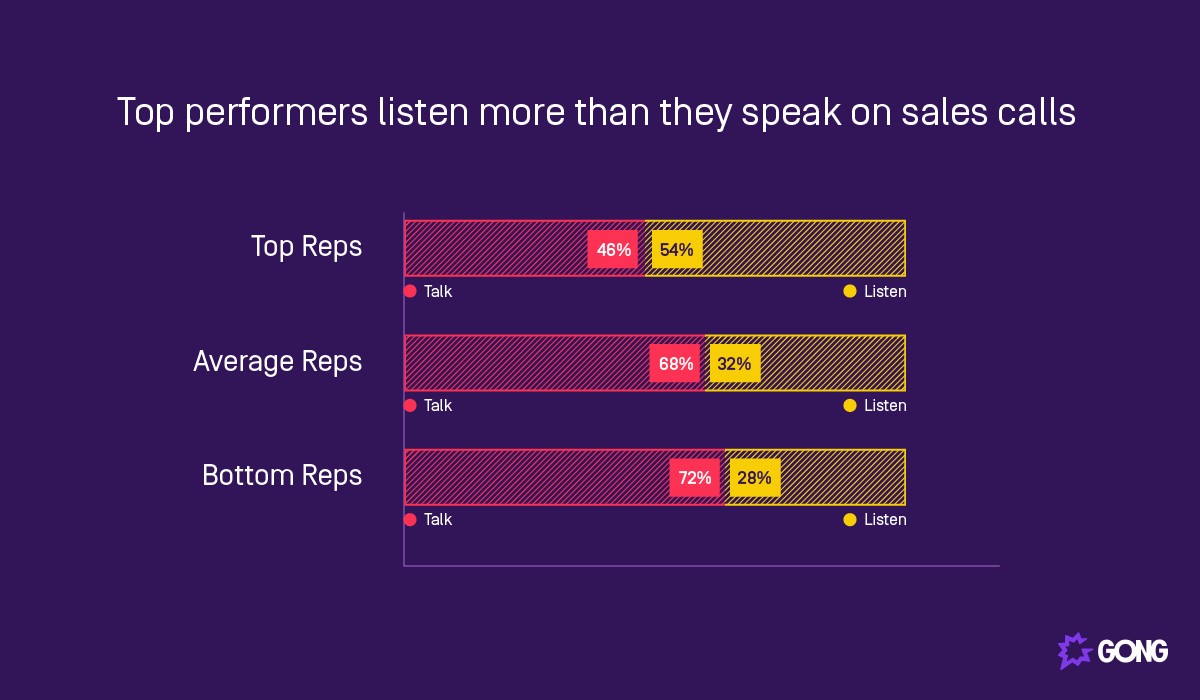
Sales reps who exceed their quotas have a talk-to-listen ratio of 46:54. That’s well above the 68:32 ratio of average reps and miles better than the 72:28 ratio of underperforming reps.
5. Control the meeting
When employing a conceptual selling strategy, your reps must make the most of every meeting. Every time they meet with a prospect is a chance to sell that prospect on the concept.
The key to controlling a meeting is creating a sweet pitch. Another is to ensure that your reps don’t bore their buyer when pitching.
That means tapering the amount of time spent pitching.
Our research shows that the best-performing reps spend 9 minutes or less presenting.
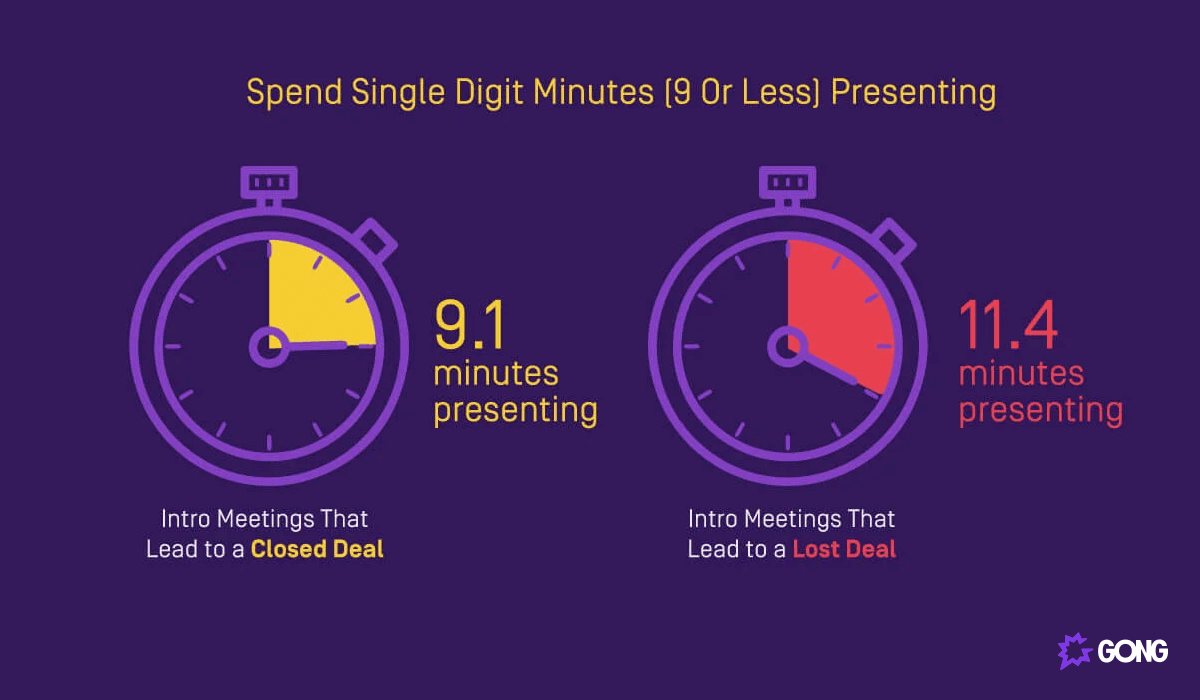
Seems short, right?
But by keeping your pitch short, you keep the buyer engaged. Keeping it short also allows for more time to pose and answer questions — which, as you already know, are a crucial part of concept selling.
6. Personalize your pitch
There’s no one-size-fits-all scenario in consultative selling. The whole point of conceptual selling is that your product can mean different things to different people.
And that means your reps need to personalize their sales pitch. But what’s the best way to do this?
Make their pain points the major part of your pitch, and have your reps speak specifically about how your solution will solve their issues. Only use case studies if they’re incredibly relevant.
Of course, this means your reps will have to spend longer creating their pitch, but that will be time well spent.
7. Differentiate your solution
While your reps are personalizing their pitch, make sure they are also differentiating your solution from that of your competitors while relating it to the buyer’s desires.
That last part is key to creating the perception of value.
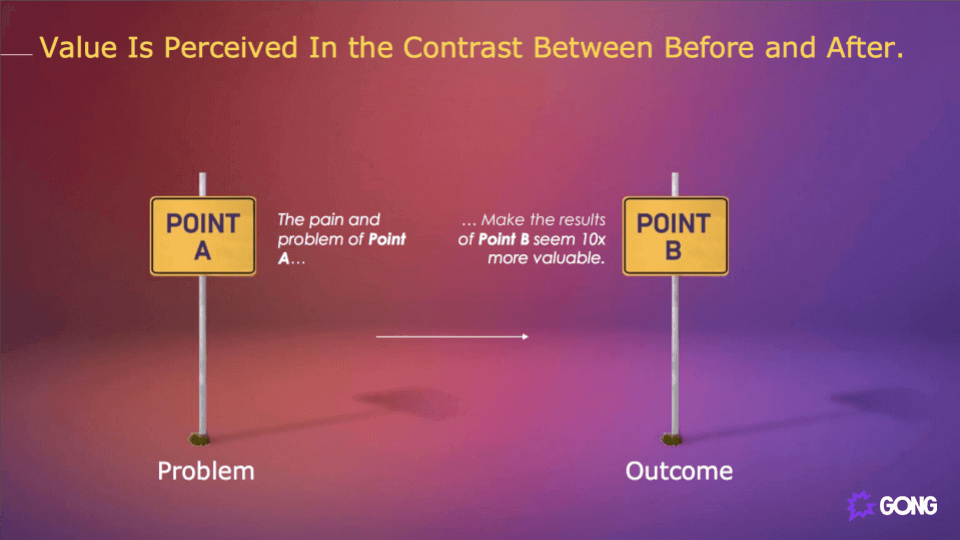
Value is perceived when your buyer can see the contrast between the before and the after. Have your reps show the buyer that only your product can get them from Point A to Point B, as in the image above.
8. Move the meeting forward
There are more buying interactions to close a deal today than ever before. During the Covid-19 pandemic, the number of interactions jumped from 17 to 27. That means you’ll need more than one meeting to win a sale.
As such, reps need to make sure each meeting is a productive use of their time by asking questions that move it forward.
In particular, discuss the next steps during every meeting.
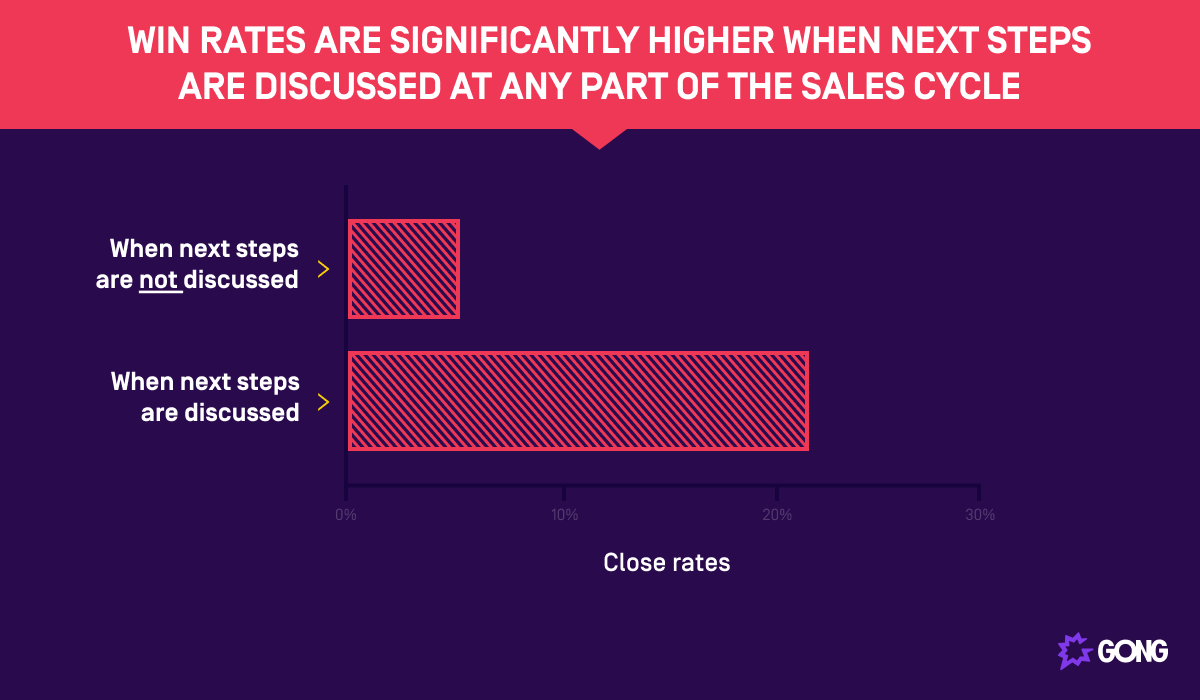
Our research shows that win rates are much higher when the next steps are discussed at every part of the sales cycle.
The best questions to ask for conceptual sales
Questions are key to your reps’ success as conceptual sellers. It’s all about getting information, giving information, and getting commitment.
There are five stages of questions in conceptual selling:
- Confirmation questions
- New information questions
- Attitude questions
- Commitment questions
- Basic issue questions
Confirmation questions
Your reps need to confirm the information they have learned or researched.
They should ask questions like:
- How long has this been a problem?
- What’s your budget to fix this problem?
- Who signs off on purchases?
New information questions
Once a rep has their buyer on the phone, they need to learn what makes the buyer tick and what pain points they’re suffering from. You can think of them as discovery questions.
They should ask questions like:
- What solutions have you tried so far?
- What other problems are you suffering from?
- Who is the decision-maker?
Attitude questions
Sales reps need to understand everything about the buyer, including what they stand to gain from your solution.
They should ask questions like:
- Are you open to new solutions?
- How quickly can you execute a new solution?
- What’s stopping you from moving forward?
Commitment questions
In order to close the sale, reps need to ask questions that get commitment from the prospect. These are similar to bant questions.
They should ask questions like:
- What is a solution worth to you?
- What’s your deadline for finding a solution?
- Who else do I need to speak to about this problem?
Basic issue questions
Buyers will always have objections. It’s your sales reps’ job to ask questions to determine what those objections are.
They should ask questions like:
- How much money are you wasting on this issue?
- Why haven’t you solved this yet?
- What would stop you from signing a deal today?
Sell conceptually with Gong
Conceptual selling gets to the heart of why buyers make purchase decisions.
It’s not because of facts, data, or one product being better than another. It’s all based on a concept that buyers create.
When your team understands that, they can use the consultative approach outlined in the concept selling framework to paint your product in the best light possible.
Monitoring your team’s performance is key when adopting any new sales process, and conceptual selling is no different. Gong makes it easy to track team performance and identify areas where reps can improve.
Gong Assist can even suggest the best steps to keep the sale progressing. That’s a lot of power in one tool. Book a demo to find out more.